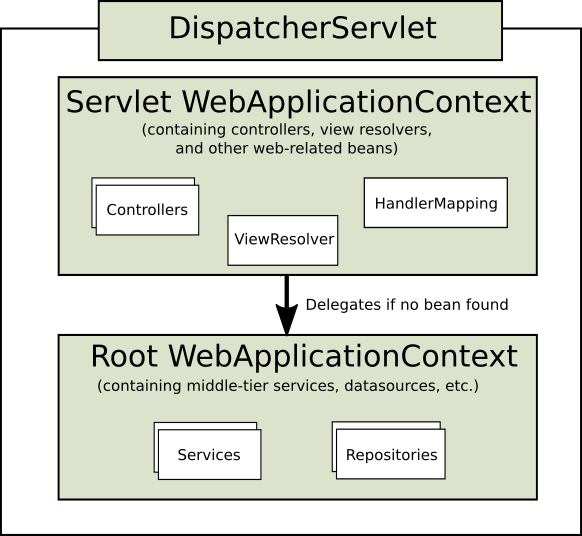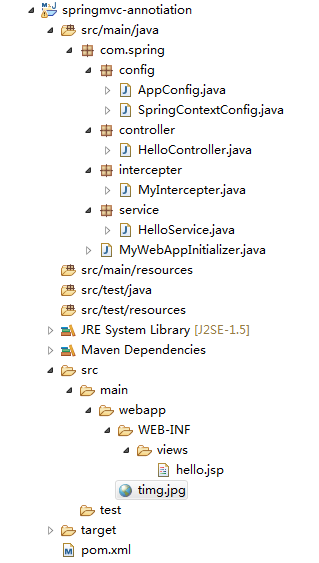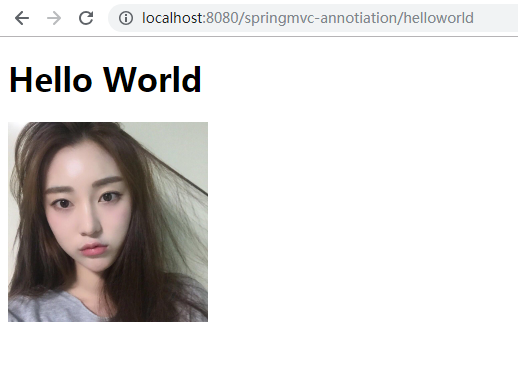1.以前搭建Spring MVC 框架一般都使用配置文件的方式进行,相对比较繁琐。spring 提供了使用注解方式搭建Spring MVC 框架的方式,方便简洁。使用Spring IOC 作为根容器管理service、dao、datasource,使用spring MVC 容器作为子容器管理controller、视图解析器

spring 官方文档中有相关示例
public class MyWebAppInitializer extends AbstractAnnotationConfigDispatcherServletInitializer { @Override protected Class<?>[] getRootConfigClasses() { return new Class<?>[] { RootConfig.class }; } @Override protected Class<?>[] getServletConfigClasses() { return new Class<?>[] { App1Config.class }; } @Override protected String[] getServletMappings() { return new String[] { "/app1/*" }; } }
使用继承 AbstractAnnotationConfigDispatcherServletInitializer 的方式创建启动类,其中 getRootConfigClasses 指定父容器的配置类,相当于在web.xml 配置文件中配置监听器加载spring的配置文件,getServletConfigClasses指定spring MVC 的配置文件,相当于在web.xml配置DispatcherServlet,getServletMappings 执行拦截路径。
2.首先创建一个Maven 工程,packaging 为war类型,并在插件中指定忽略web.xml,否则会报错
<build> <plugins> <plugin> <groupId>org.apache.maven.plugins</groupId> <artifactId>maven-war-plugin</artifactId> <version>3.1.0</version> <configuration> <failOnMissingWebXml>false</failOnMissingWebXml> </configuration> </plugin> </plugins> </build>
3.创建spring IOC 的配置类,管理除了Controller 以外的组件
package com.spring.config; import org.springframework.context.annotation.ComponentScan; import org.springframework.context.annotation.FilterType; import org.springframework.context.annotation.ComponentScan.Filter; import org.springframework.stereotype.Controller; /** * spring 配置文件,构建父容器,扫描service、dao 等,但是controller交给spring mvc 来管理 * @author Administrator * */ @ComponentScan(value="com.spring",excludeFilters= { @Filter(type=FilterType.ANNOTATION,classes= {Controller.class}) }) public class SpringContextConfig { }
4.创建Spring MVC 配置类,管理Controller,注意此时需要关闭compentscan 默认的扫描规则,否则会扫描到所有的组件。这样这个容器的就形成了一种互补关系。
@ComponentScan(value = "com.spring",includeFilters= { @Filter(type = FilterType.ANNOTATION,classes= {Controller.class}) },useDefaultFilters=false) public class AppConfig extends WebMvcConfigurerAdapter{ }
5.创建初始化类,指定两个容器的配置类,并指定拦截路径
package com.spring; import org.springframework.web.servlet.support.AbstractAnnotationConfigDispatcherServletInitializer; import com.spring.config.AppConfig; import com.spring.config.SpringContextConfig; public class MyWebAppInitializer extends AbstractAnnotationConfigDispatcherServletInitializer { //获取父容器的配置文件(spring IOC ,类似于spring 配置文件) @Override protected Class<?>[] getRootConfigClasses() { // TODO Auto-generated method stub return new Class<?>[] {SpringContextConfig.class}; } //获取父容器的配置文件(springMVC IOC ,类似于spring MVC 配置文件,获取DispatcherServlet) @Override protected Class<?>[] getServletConfigClasses() { // TODO Auto-generated method stub return new Class<?>[] {AppConfig.class}; } //获取DispatcherServlet 的映射路径 @Override protected String[] getServletMappings() { // TODO Auto-generated method stub return new String[]{"/"}; } }
6.编写测试controller ,services,启动并测试
package com.spring.controller; import org.springframework.beans.factory.annotation.Autowired; import org.springframework.stereotype.Controller; import org.springframework.web.bind.annotation.RequestMapping; import org.springframework.web.bind.annotation.ResponseBody; import com.spring.service.HelloService; @Controller public class HelloController { @Autowired HelloService helloService; @ResponseBody @RequestMapping("/hello") public String sayHello() { String sayHello = helloService.sayHello("World"); return sayHello; } }

7.之前采用配置文件的方式,我们可以需要在spring MVC 的配置文件中使用 <mvc:annotation-driven/> 去开始MVC 配置,并且配置如视图解析器,拦截器等组件,在采用注解方式后同样可以完成在配置文件中完成的东西,官方文档中给出的示例,需要我们编写一个配置类,然后开启mvc注解,实现 WebMvcConfigurer 接口,这个接口定义了一系列方法对应 在spring MVC 配置文件中配置组件的方法。
@Configuration @EnableWebMvc public class WebConfig implements WebMvcConfigurer { // Implement configuration methods... }
8.直接在spring MVC 容器的配置类似,实现以上功能,并配视图解析器,静态资源拦截,添加拦截器等。WebMvcConfigurerAdapter 这个抽象类实现了 WebMvcConfigurer ,我们直接继承它,从而避免去挨个实现 WebMvcConfigurer 里面所有的方法
package com.spring.config; import org.springframework.context.annotation.ComponentScan; import org.springframework.context.annotation.ComponentScan.Filter; import org.springframework.context.annotation.FilterType; import org.springframework.stereotype.Controller; import org.springframework.web.servlet.config.annotation.DefaultServletHandlerConfigurer; import org.springframework.web.servlet.config.annotation.EnableWebMvc; import org.springframework.web.servlet.config.annotation.InterceptorRegistry; import org.springframework.web.servlet.config.annotation.ViewResolverRegistry; import org.springframework.web.servlet.config.annotation.WebMvcConfigurerAdapter; import com.spring.intercepter.MyIntercepter; /** * Spring mvc 配置文件,只扫描Controller * @author Administrator * */ @ComponentScan(value = "com.spring",includeFilters= { @Filter(type = FilterType.ANNOTATION,classes= {Controller.class}) },useDefaultFilters=false) @EnableWebMvc public class AppConfig extends WebMvcConfigurerAdapter{ @Override public void configureViewResolvers(ViewResolverRegistry registry) { registry.jsp("/WEB-INF/views/", ".jsp"); } @Override public void configureDefaultServletHandling(DefaultServletHandlerConfigurer configurer) { configurer.enable(); } @Override public void addInterceptors(InterceptorRegistry registry) { registry.addInterceptor(new MyIntercepter()).addPathPatterns("/**"); } }
下面是自定义的拦截器
package com.spring.intercepter; import javax.servlet.http.HttpServletRequest; import javax.servlet.http.HttpServletResponse; import org.springframework.web.servlet.HandlerInterceptor; import org.springframework.web.servlet.ModelAndView; public class MyIntercepter implements HandlerInterceptor{ public boolean preHandle(HttpServletRequest request, HttpServletResponse response, Object handler) throws Exception { System.out.println("----------目标方法执行前-------------"); return true; } public void postHandle(HttpServletRequest request, HttpServletResponse response, Object handler, ModelAndView modelAndView) throws Exception { System.out.println("----------目标方法执行后-------------"); } public void afterCompletion(HttpServletRequest request, HttpServletResponse response, Object handler, Exception ex) throws Exception { System.out.println("----------页面响应前-------------"); } }

测试controller 如下:
package com.spring.controller; import org.springframework.beans.factory.annotation.Autowired; import org.springframework.stereotype.Controller; import org.springframework.web.bind.annotation.RequestMapping; import org.springframework.web.bind.annotation.ResponseBody; import com.spring.service.HelloService; @Controller public class HelloController { @Autowired HelloService helloService; @ResponseBody @RequestMapping("/hello") public String sayHello() { String sayHello = helloService.sayHello("World"); return sayHello; } @RequestMapping("/helloworld") public String helloWorld() { return "hello"; } }
测试结果如下,成功跳转到jsp,并且显示了图片,拦截器也做了相应的输出


至此基本完成Spring MVC 注解版搭建,其余的功能组件可以在通过编写配置类的方式进行注册。